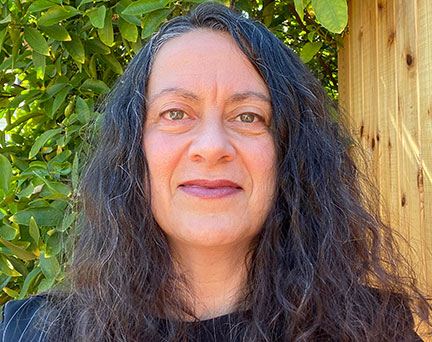Interview with Deborah Jonas
June 15, 2021

Dr. Andrea Venezia joined SRI Education in May as our new director of college and career pathways research, co-leading the program area with Dr. Miya Warner. Most recently, Andrea was a professor of public policy and administration at Sacramento State University and executive director of the Education Insights Center. She has held positions at WestEd and the National Center for Public Policy and Higher Education, distinguishing herself as a scholar and applied researcher focused on reducing barriers to postsecondary education for historically marginalized students. She has authored, co-authored, and co-edited numerous reports, chapters, articles, and books, including Supporting the College Dream (2015) by Corwin Press, Minding the Gap: Why Integrating High School with College Makes Sense and How to Do It (2007) published by Harvard Education Press, and From High School to College (2004) published by Jossey-Bass. Andrea holds an MA in administration and policy analysis in higher education from Stanford University, and a PhD in public policy from the Lyndon B. Johnson School of Public Affairs at the University of Texas at Austin. We asked Andrea to share a little about herself and her research priorities.
What drew you to the field of the education?
For me, education was always a clear and compelling path. My grandmother became a parent as a teenager and dropped out of school to support her family by working in the garment industry. She always told me that I needed to get the education she couldn’t have and find ways to contribute to the world. Both of my parents worked in public education in California, and they viewed education as the way they each got out of poverty.
Fast forward—in college, I served on the search committee for a new college president. I read over 400 resumes from leaders in higher education. Seeing their career trajectories, and the impacts they had over their impressive careers, inspired me. My first professional experience was a year later; as a graduate student, I worked for SRI and did qualitative research on K-12 reform efforts in Kentucky—so this feels a bit like coming home.
What are your research interests?
I am passionate about supporting people and systems in creating more racially equitable opportunities and outcomes for students within and across K-12 and higher education. For the past 3 decades, my research and capacity building efforts have been focused on systems change related to students’ transitions from high school to and through college. This transition is particularly important because access to some form of postsecondary education can hold the key to economic mobility, or it can lead to students accumulating enormous debt with no credential – and a lot in between. The U.S. has created education systems that allow students to fall through cracks all along the way, and the structural barriers students encounter harm historically minoritized and marginalized students the most.
What are you most proud of achieving so far in your career?
I’ve been really lucky because every phase of my career has included something about which I’m proud – and that’s always been a product of relationships and collaboration. When I worked at Stanford, Michael Kirst, Anthony Antonio, and I wrote Betraying the College Dream (2003), based on learnings from a 6-year national study that was a team effort. We highlighted many of the systemic disconnects between high school and college that create huge inequities for students. The study led to important discussions in the field and actions. Fast forward, and a team I led at WestEd wrote One Shot Deal (2010, with Kathy Reeves Bracco and Thad Nodine) that analyzed assessment and course placement policies in California’s community colleges, and centered students’ voices about how those policies affected them. More recently, as the director of the EdInsights Center at Sacramento State, I had the honor of working with former colleagues to co-create the California Education Policy Fellowship Program and the California State University Student Success Network. Both professional networks provide spaces to build relationships and focus on equity- and evidence-driven actions to improve opportunities and outcomes for students.
What are you most excited about as you join SRI?
I can’t wait to get back to my research roots and to be a part of a team that’s focused on equity-driven, student-centered inquiry—and to get back into work that’s national in focus, in addition to state-based projects. While I loved being an executive director and a professor, I had limited time for research, and I really missed that kind of learning and teamwork that education research requires. The people and team structures at SRI are incredible and were a big part of my decision to make this career change.
What are some of your priorities related to college and career readiness and success?
Action-oriented researchers and technical assistance providers can have a key role in helping educators and higher education institutions support students as we emerge out of the pandemic. I think the focus needs to be on holistic supports and on helping students reclaim a sense of joy in learning and in life.
More specifically related to college and career readiness, I have a host of questions I’d love to explore through researcher-practitioner partnerships in higher education. Also, I think we have a lot to learn about racial equity with regard to access to curricular opportunities within and across high schools, community colleges, and universities—to understand who has access to preparation for and completion of different pathways through college and into careers. And having pushed for California to create a statewide longitudinal data system since the late 1990s, I’m excited to partner with quantitatively oriented colleagues once this cross-sector system is launched to address pressing questions for students and educators in California.
Topics: Access and equity Community colleges Dual enrollment First-generation college students High school redesign Implementation research Integrated college and career pathway approaches Linked learning Low income Research and evaluation Students of color Transition to postsecondary
